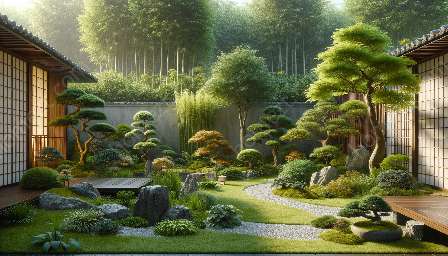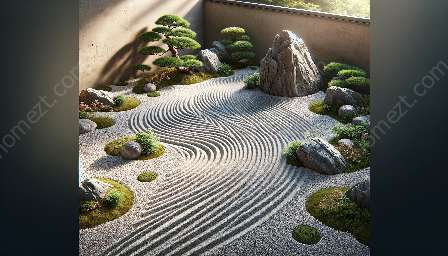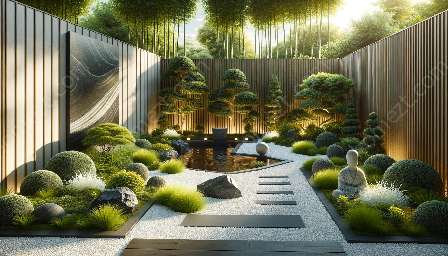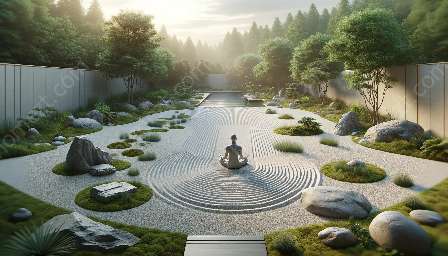Zen garden architecture is a timeless art form that encapsulates the harmonious and tranquil essence of Zen philosophy. It seamlessly integrates with both the spiritual practice of Zen gardens and the meticulous craft of gardening and landscaping.
Understanding Zen Garden Architecture
At its core, zen garden architecture is a reflection of the principles of Zen philosophy, aiming to create a space for meditation and contemplation. It involves a deliberate arrangement of elements to evoke a sense of tranquility, simplicity, and natural beauty.
The Elements of Zen Garden Architecture
Rocks and Gravel: The use of rocks and gravel symbolizes mountains and rivers, creating a sense of rugged natural landscapes within a confined space.
Water Features: A key element often found in zen garden architecture, water features such as ponds or small streams represent the flow of life and offer a soothing presence.
Plants and Trees: Carefully selected plants and trees, typically ones native to Japan, are strategically placed to create a sense of balance and harmony with the surrounding environment.
Structural Elements: Simple yet elegant wooden structures, stone lanterns, and pathways guide the flow of movement and add a touch of architectural beauty to the garden.
The Principles of Zen Garden Architecture
Simplicity (Kanso): Emphasizing minimalism and eliminating unnecessary elements to create a sense of calm and clarity.
Tranquility (Seijaku): Encouraging a serene and peaceful atmosphere that promotes inner reflection and meditation.
Naturalness (Shizen): Embracing the organic and unaltered beauty of nature by integrating natural elements harmoniously.
History of Zen Garden Architecture
Zen garden architecture has its roots in ancient Japan, where it was closely associated with Zen Buddhism. The earliest known Zen gardens, or karesansui gardens, date back to the Muromachi period (14th-16th centuries) and were created within Buddhist temples as places for meditation and contemplation.
These early gardens were designed with meticulous attention to detail, with every element carefully chosen to evoke a sense of spiritual tranquility. Over time, the influence of Zen garden architecture spread beyond Japan, inspiring designers and garden enthusiasts around the world.
Zen Gardens: Spiritual Oasis
A Zen garden, also known as a dry landscape or rock garden, is a minimalist and serene space designed for quiet contemplation. It draws its inspiration from the principles of Zen Buddhism and is an integral part of Zen garden architecture. The design of a Zen garden often features carefully raked gravel or sand, symbolizing ripples in water or waves in the ocean. Rocks and carefully placed plants are used to create a sense of balance and harmony. These gardens are meant to evoke a feeling of tranquility and provide a space for meditation and reflection.
Traditional Zen gardens often include elements such as stone lanterns, bridges, and water basins, each with its symbolic significance tied to Buddhist teachings. These tranquil havens can be found in temple grounds, private residences, and public spaces, serving as an oasis for individuals seeking solace and inner peace.
Gardening and Landscaping in Zen Philosophy
The practice of gardening and landscaping in the context of Zen philosophy goes beyond mere cultivation and design. It encompasses a deep reverence for nature, an appreciation for simplicity, and a focus on creating harmonious outdoor spaces that resonate with the principles of Zen.
By incorporating elements of Zen garden architecture, such as careful placement of rocks and plants, the use of natural materials, and a mindful approach to spatial arrangement, gardening and landscaping can transcend the purely aesthetic and become a means of spiritual expression.
Both novice and seasoned gardeners and landscapers find inspiration in Zen philosophy, as it encourages a mindful approach to caring for the natural environment and creating places of beauty and tranquility.
In Conclusion
Zen garden architecture provides a profound and immersive experience, blending spiritual depth with meticulous design and natural beauty. The principles and elements inherent in this architectural practice have transcended time and cultural boundaries, influencing landscapes and minds alike. By delving into the essence of Zen garden architecture, one gains a deeper understanding of the interconnectedness between nature, design, and spiritual well-being.





















